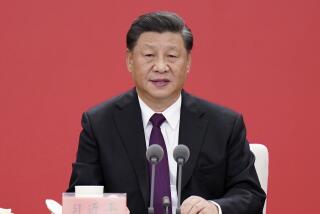Reeled In by a Spoof, Chinese Daily Shrugs Off Its Capitol Error
- Share via
BEIJING — A gaffe by China’s usually staid state-run media has left a popular newspaper here with onion on its face.
Readers of the Beijing Evening News, one of the capital’s largest-circulation newspapers, learned this week that the U.S. Congress had threatened to move out of Washington unless a fancy new Capitol was built.
“Don’t get us wrong. We actually love the dilapidated [old] building,” House Speaker J. Dennis Hastert (R-Ill.) was quoted as saying. “But the cruel reality is, it’s no longer suitable for use by a world-class legislature. Its contours are ugly, there’s no room to maneuver, there aren’t enough bathrooms, and let’s not even talk about the parking.”
If a new building wasn’t erected, the article said, lawmakers were prepared to pack up and move to Memphis, Tenn., or Charlotte, N.C.
The story seems newsworthy enough. Trouble is, it was lifted straight from the Onion, a satirical “news” publication based in New York that has caused countless American readers to double over with laughter at its weekly spoofs on current events.
Its story on the Capitol appeared in its May 29 edition, alongside such headlines as “Sexual Tension Between Arafat, Sharon Reaches Breaking Point” and “Man Blames Hangover on Everything But How Much He Drank.”
A writer for the Beijing Evening News apparently picked up the item from the Internet, reworked the opening paragraphs and submitted it to his editors, who then published it Monday as a news story, without citing a source.
Nobody, perhaps not even the reporter, appeared to realize that it was a joke.
Yu Bin, the editor in charge of international news, acknowledged Thursday that he had no idea where the writer, Huang Ke, originally got the story. Yu said he would tell Huang to “be more careful next time.”
But he adamantly ruled out a correction and grew slightly obstreperous when pressed to comment on the article’s total lack of truth.
“How do you know whether or not we checked the source before we published the story?” Yu demanded in a phone interview. “How can you prove it’s not correct? Is it incorrect just because you say it is?”
For the record, John Feehery, Hastert’s spokesman, said the congressman never made the remarks attributed to him.
“He likes the Capitol just fine,” Feehery said.
However, the office of House Minority Leader Richard A. Gephardt (D-Mo.) did not respond to a request Thursday for comment. Gephardt was alleged to have said, “Look at the British Parliament. Look at the Vatican.... Without modern facilities, they’ve been having big problems attracting top talent.”
The Onion parody featured an architect’s rendering of a proposed futuristic Capitol complete with a retractable dome, a “Dancing Waters fountain” and “55 more luxury boxes than the current building.” The Beijing paper reproduced the entire illustration without crediting the Onion. There wasn’t even a caption explaining what the drawing was.
Robert Siegel, editor in chief of the Onion, which prides itself as “America’s finest news source,” said he was amazed at the Chinese paper’s gullibility.
“Wow, even journalists now believe everything they read,” Siegel said from his home in New York. “If I were a reporter in Beijing and found an item like that ... I might want to follow up and check my sources. Readers fall for that kind of thing all the time, and maybe I was naive, but I thought reporters would be smarter.”
That the Beijing Evening News cribbed the Onion article is actually not so surprising in a land where movies, pop albums and books are pirated and sold on the streets.
Though still under the thumb of the government, the media in China have become more freewheeling and more competitive, forced to duke it out for market share and turn a profit.
The Beijing Evening News, which boasts a circulation of about 1 million, is fighting off challenges from a raft of other newspapers and magazines.
Many papers now rely on contract freelancers to provide all sorts of content. This has given rise to a slew of young, Internet-savvy, English-speaking writers who freely lift stuff from the Web and submit it to editors who adopt a “don’t ask, don’t tell” attitude toward the material’s origins.
One man who used to contribute pieces to a financial publication--he asked not to be identified--said he would simply take copy from British and U.S. news services and translate it into Chinese.
Huang, the author of the Beijing Evening News article on the unloved U.S. Capitol, couldn’t be reached for comment Thursday.
He or she--the name is androgynous and very likely a pseudonym--appears not to be one of the paper’s longtime contributors. An electronic archive search on the paper’s Web site yielded Huang’s byline on only two stories in the last two years.
Both appeared in Monday’s edition. One was the Onion rip-off. The other, on the same page, was an investigative piece about the lack of security screening for most private charter flights in the U.S.
But a little checking showed that this story too was cribbed: It was a direct translation of a front-page article from Sunday’s Washington Post.
More to Read
Sign up for Essential California
The most important California stories and recommendations in your inbox every morning.
You may occasionally receive promotional content from the Los Angeles Times.











